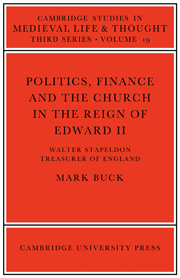Book contents
- Frontmatter
- Contents
- Dedication
- Acknowledgements
- Abbreviations
- 1 INTRODUCTION
- 2 FAMILY AND EARLY LIFE
- 3 THE BISHOPRIC OF EXETER
- 4 ROYAL FREE CHAPELS
- 5 THE FOUNDATION OF STAPELDON HALL
- 6 POLITICS AND DIPLOMACY 1309–13
- 7 THE CONSOLIDATION AND COLLAPSE OF ROYAL POWER 1320–1326
- 8 THE EXCHEQUER
- 9 THE CASE AGAINST STAPELDON
- 10 MURDER
- Appendix of documents
- Bibliography
- Index
6 - POLITICS AND DIPLOMACY 1309–13
Published online by Cambridge University Press: 05 November 2011
- Frontmatter
- Contents
- Dedication
- Acknowledgements
- Abbreviations
- 1 INTRODUCTION
- 2 FAMILY AND EARLY LIFE
- 3 THE BISHOPRIC OF EXETER
- 4 ROYAL FREE CHAPELS
- 5 THE FOUNDATION OF STAPELDON HALL
- 6 POLITICS AND DIPLOMACY 1309–13
- 7 THE CONSOLIDATION AND COLLAPSE OF ROYAL POWER 1320–1326
- 8 THE EXCHEQUER
- 9 THE CASE AGAINST STAPELDON
- 10 MURDER
- Appendix of documents
- Bibliography
- Index
Summary
The middle years of the reign of Edward II were fraught with shifting allegiances, political stalemate, curial intrigue and dangerous uncertainty. The bishop of Exeter, whom T. F. Tout considered ‘one of the most puzzling characters of the reign’, is never more puzzling than in these years. Probably committed to the king from the start, yet conspicuous by his absence at almost all politically contentious moments, he divided his time fairly evenly between royal service and pastoral activity. His involvement in government was therefore limited. Only M. V. Clarke has as yet devoted any serious attention to the nature of this involvement. She has portrayed him as the leader of a ‘middle party’ of prelates, zealous in their defence of constitutional forms and anxious to lighten the burden of royal taxation falling upon the clergy. And she surmises that in 1316 he incurred royal disfavour as a consequence.
In the light of this assessment, one might also expect Stapeldon to have achieved historiographical acclaim as a member of that ‘middle party’ which, led by the earl of Pembroke, had as its objectives treaty with earl Thomas of Lancaster, the establishment of strong government and enforcement of the Ordinances. But Stapeldon's absence from the Avignon mission of December 1316 and his lack of involvement in the negotiations preceding the treaty of Leake of August 1318 precluded his inclusion in such a political grouping.
- Type
- Chapter
- Information
- Politics, Finance and the Church in the Reign of Edward II , pp. 115 - 130Publisher: Cambridge University PressPrint publication year: 1983



